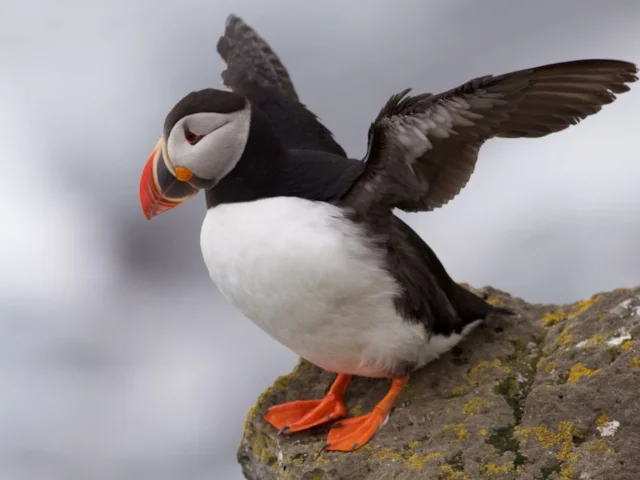Europe's shocking lack of marine protection
e275c72f-f0ac-43c1-b2c5-c59b2323c139

More than 40 per cent of Europe's best marine bird and wildlife areas remain unprotected, a BirdLife report has discovered.
Along with this alarming figure of neglected marine Important Bird and Biodiversity Areas (marine IBAs) in Europe, it has emerged that two thirds of EU countries only protect 3 per cent or less of their marine area (Territorial sea and Exclusive Economic Zones).
These are some of the shocking findings of Birdlife’s report Marine Natura 2000 Progress Assessment released today. The report assessed the progress of 23 EU coastal countries in designating Special Protection Areas, using as reference BirdLife’s marine IBAs.
Conserving seabirds and their habitat both on land and at sea is a requirement under the European Birds Directive. It is also essential to ensure seabirds and their habitats are conserved to address the EU’s Biodiversity targets. Since 1979, EU countries have been obliged to protect seabirds through Special Protection Areas (SPAs) but many countries have failed to do so, particularly in the marine environment. There is an urgent need to identify these areas in each country.
According to Marguerite Tarzia, Marine Conservation Officer at BirdLife Europe: “Europe’s seabirds are facing a variety of different threats, from by-catch to habitat loss and disturbance from human activities at sea. BirdLife’s country factsheets and interactive maps indicate that protection at sea is still lacking, the EU’s network is incomplete and we are not managing existing sites”.
Today’s report also shows that despite some Member States having identified marine IBAs through EU funded projects, many countries, such as Portugal, are still lagging behind in actually protecting them. Although some countries, such as Germany, Spain and Poland have made some excellent progress with protecting sites for seabirds at sea, most countries are only protecting a fraction of their marine area. Overall the progress for SPA designation for seabirds in Europe is insufficient, with eight countries ranked officially as Poor, and only three achieving an assessment of Very Good.
"The EU is still one of the main offenders in polluting and pillaging the ocean, and has been failing for decades to give formal protection to even the most precious corners of our seas," said Bruna Campos, EU Marine and Fisheries Policy Officer. "The European Commission must not let Member States off the hook for not implementing the nature Directives and see about taking them to court in the near future against this shameful inaction.”
Along with this alarming figure of neglected marine Important Bird and Biodiversity Areas (marine IBAs) in Europe, it has emerged that two thirds of EU countries only protect 3 per cent or less of their marine area (Territorial sea and Exclusive Economic Zones).
These are some of the shocking findings of Birdlife’s report Marine Natura 2000 Progress Assessment released today. The report assessed the progress of 23 EU coastal countries in designating Special Protection Areas, using as reference BirdLife’s marine IBAs.
Conserving seabirds and their habitat both on land and at sea is a requirement under the European Birds Directive. It is also essential to ensure seabirds and their habitats are conserved to address the EU’s Biodiversity targets. Since 1979, EU countries have been obliged to protect seabirds through Special Protection Areas (SPAs) but many countries have failed to do so, particularly in the marine environment. There is an urgent need to identify these areas in each country.
According to Marguerite Tarzia, Marine Conservation Officer at BirdLife Europe: “Europe’s seabirds are facing a variety of different threats, from by-catch to habitat loss and disturbance from human activities at sea. BirdLife’s country factsheets and interactive maps indicate that protection at sea is still lacking, the EU’s network is incomplete and we are not managing existing sites”.
Today’s report also shows that despite some Member States having identified marine IBAs through EU funded projects, many countries, such as Portugal, are still lagging behind in actually protecting them. Although some countries, such as Germany, Spain and Poland have made some excellent progress with protecting sites for seabirds at sea, most countries are only protecting a fraction of their marine area. Overall the progress for SPA designation for seabirds in Europe is insufficient, with eight countries ranked officially as Poor, and only three achieving an assessment of Very Good.
"The EU is still one of the main offenders in polluting and pillaging the ocean, and has been failing for decades to give formal protection to even the most precious corners of our seas," said Bruna Campos, EU Marine and Fisheries Policy Officer. "The European Commission must not let Member States off the hook for not implementing the nature Directives and see about taking them to court in the near future against this shameful inaction.”

